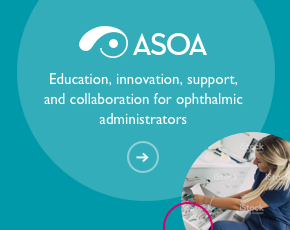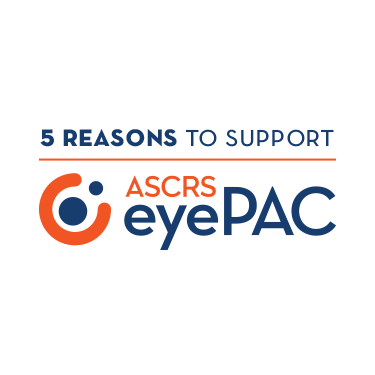|

COVID-19's Effects on International Humanitarian Eyecare
Internationally, the ASCRS Foundation fights cataract blindness through a focus on education to address the shortage of eye surgeons, creating world-class medical centers, such as the Sinskey Eye Institute, and raising the local standards for patient care and physician training. Barbara C. Erny, MD, the Foundation’s Medical Liaison for International Programs has had an incredible impact in unifying the efforts of the Foundation with its partner organizations, to widen our international reach. We interviewed Dr. Erny to see how COVID-19 is impacting humanitarian eyecare; please find her interview below:
Dr. Erny, you frequently travel to Ethiopia, how has the COVID-19 pandemic affected your own travel plans?
In March, I had planned to fly to Ethiopia to participate in the ICO Board Review Course. As my departure date approached, I was feeling more and more uneasy about traveling, but was determined to go. I struggled with my decision to let down Joe Licht, DO, the Emory fellow in Addis who had done so much work to arrange the course. On Friday March 13th, I woke up to a slew of messages that the first case of the novel Corona virus was detected in Ethiopia, and that the course was being called off. The doctors were jumping on a response, having learned a lesson from those countries slow to respond.
What were the consequences of this decision on the ICO Board Review Course and residents?
The ICO boards review course has been postponed (as well as the exam) and changed to an all online format. Professors have recorded their slide shows with narration, and all lectures are being uploaded to Cybersight with the aid of our partners at Orbis. These talks will be available for anyone to view, and residents in Rwanda and Ghana are already planning to watch them.
Dr. Erny, it sounds like the ICO Board Review Course was quick to move learning online for residents. The Foundation has 6 Residency Training locations in Ethiopia; what precautions are the ophthalmologists taking medically?
I connected with Liya Solomon, MD, at Gondar University, to find out how that resident training location is doing. Dr. Solomon reported that the ophthalmologists are wearing N95 masks and goggles and have large cardboard shields on the slit lamps. Patients and family are required to wear facemasks and maintain social distancing in the waiting areas. The ophthalmologists are doing emergency surgery and some elective cases; however, the junior residents have been relegated to the wet labs. Dr. Solomon added that most of the resident teaching is now online with an increased number of seminars, and some senior residents have changed their research projects to retrospective studies. At the hospital compound, there is a COVID-19 treatment center building which is next to the eye department. To avoid confusion for patients, the walkway is now guarded by federal police. The senior staff does what they can to minimize their exposure and they all live inside the compound surrounding the hospital.
How would you describe life outside of the hospital walls for Ethiopians?
Dr. Solomon mentioned that public transportation is functional with fewer seats available and there are fines for not complying with new rules, but that people still go to markets and churches where social distancing is difficult. Unfortunately, Dr. Solomon reports that “the cost of living is rising, with vegetables, fruit, and other staples being sold for double the previous price.”
I am sorry to hear that the cost of living is rising, I think this a trend we have unfortunately seen in other parts of the world amidst the pandemic. I know that you visit Sinskey Eye Institute, the ASCRS Foundation’s large hospital in Addis Aba, Ethiopia often. SEI serves over 24,000 patients annually, how are they coping during this?
They are doing surgery occasionally for bilaterally blind, uniocular blind and any urgent cases. While the staff continues to go to the clinic every weekday, as usual, there is a growing concern on the rising numbers of COVID-19 and the number of medical personnel infected. Ayalew Allehone, MD, the senior Ophthalmologist at Sinskey Eye Institute, who mentors rotating residents, said the hospital is taking measures against COVID-19. Dr. Allehone explained, "We are managing our corridors by calling fewer patients at a time, keeping out relatives of patients unless they are needed, and ventilating our exam rooms by keeping windows wide open, using available PPE of course, and praying."
Dr. Allehone and the staff at SEI are being very proactive to protect staff and patients…
Yes, they are. I know this is all in addition to having patients wear masks and remain in an outdoors waiting area until called. With no sinks in the exam rooms, frequently hand sanitizing is key. With the heightened unease, Dr. Allehone was happy to have the support of the Foundation and the Himalayan Cataract Project. He mentioned, “We have received the second round of PPE material donation. We are very grateful for the unwavering support from ASCRS and HCP.”
Dr. Erny continues to be a key staff member of the ASCRS Foundation team and her firm commitment to the international initiatives has been even more appreciated during the current global pandemic.
For more information on the Foundation’s international work and the latest updates, please click here.
|


